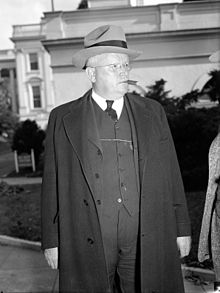Leon C. Phillips
| Leon Chase Phillips | |
|---|---|

Leon C. Phillips
|
|
| 11th Governor of Oklahoma | |
|
In office January 9, 1939 – January 11, 1943 |
|
| Lieutenant | James E. Berry |
| Preceded by | E. W. Marland |
| Succeeded by | Robert S. Kerr |
| Member of the Oklahoma House of Representatives | |
|
In office 1933-1938 |
|
| Personal details | |
| Born | December 9, 1890 Grant City, Missouri |
| Died | March 27, 1958 (aged 67) Okmulgee, Oklahoma |
| Resting place | Hillcrest Cemetery Weleetka, Oklahoma 35°20′26″N 96°07′38″W / 35.340635°N 96.127325°W |
| Nationality | American |
| Political party | Democratic |
| Spouse(s) |
|
| Profession | Lawyer |
| Religion | Methodism |
Leon Chase "Red" Phillips (December 9, 1890 - March 27, 1958) was an American attorney, a state legislator and the 11th governor of Oklahoma. As a member of the Oklahoma House of Representatives and as Speaker of the Oklahoma House of Representatives, Phillips made a name for himself as an obstructionist of the proposals of governors William H. Murray and E.W. Marland, including components of the New Deal. As governor, Phillips pushed for deep cuts, but was unable to avoid an unbalanced budget.
After retiring from politics, he worked as an attorney before his death from a heart attack. He is buried in Weleetka, Oklahoma.
Phillips was born to Rufus Putnam and Bertha Violet (Bressler) Phillips in Worth County, Missouri, and moved to Foss in Custer County, Oklahoma at an early age. While a student at Epworth University in Oklahoma City, he studied for the ministry, but changed to law and received his LL.B. from the University of Oklahoma in 1916. He married Myrtle Ellenberger of Norman, Oklahoma, on June 19, 1916, and they had two children.
Phillips was admitted to the State Bar in that year and to practice before the United States Supreme Court later. After service in World War I, as a private in the US Army, he returned to Okemah, where he practiced law.
Elected three times to the Oklahoma House of Representatives from 1933 to 1938, he served as Speaker of the House in 1935. He led opposition to proposals from governors William H. Murray and E.W. Marland, the latter of which helped him attain his seat as Speaker.
...
Wikipedia
